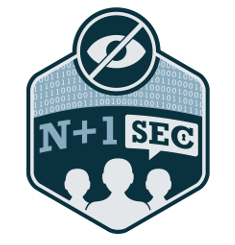https://github.com/equalitie/np1sec
A library for off-the-record (deniable authenticated forward secure confidential) multiparty messaging
https://github.com/equalitie/np1sec
Last synced: 2 months ago
JSON representation
A library for off-the-record (deniable authenticated forward secure confidential) multiparty messaging
- Host: GitHub
- URL: https://github.com/equalitie/np1sec
- Owner: equalitie
- License: lgpl-3.0
- Created: 2014-07-15T14:00:46.000Z (almost 11 years ago)
- Default Branch: master
- Last Pushed: 2017-08-14T05:12:52.000Z (almost 8 years ago)
- Last Synced: 2025-03-30T11:11:09.995Z (2 months ago)
- Language: C++
- Homepage: https://learn.equalit.ie/wiki/Np1sec
- Size: 15.9 MB
- Stars: 406
- Watchers: 43
- Forks: 31
- Open Issues: 20
-
Metadata Files:
- Readme: README.md
- License: LICENSE
Awesome Lists containing this project
README
(n+1)sec
======
(n+1)sec is a Free (libre), end-to-end secure, synchronous, multi-party messaging protocol, authored by eQualit.ie with support from the Open Technology Fund. The (n+1)sec project, similar to the OTR (off-the-record) project, makes it possible to have secure instantaneous communications between people. (n+1)sec extends upon OTR in supporting not just one-to-one chats, but also chats between arbitrary groups of people. Like OTR, (n+1)sec is built on top of arbitrary chat infrastructure systems, such as XMPP, and can be implemented in any client for these systems.

The protocol underlying this multiparty communication security is described in this [paper](https://learn.equalit.ie/wiki/Np1sec). An experimental GUI client, in the form of a Pidgin plugin is [here](https://github.com/equalitie/np1sec-test-client). A command line client, called Jabberite, is included in this repository and described [below](https://github.com/equalitie/np1sec/blob/master/README.md#testing-np1sec). This client is used for instance in [EchoChamber](https://github.com/equalitie/EchoChamber), a testing platform for the (n+1)sec protocol that simulates network conditions and peer behavior to produce programmer-friendly benchmark data.
# Building (n+1)sec
## Library dependencies
The (n+1)sec library requires the following dependencies:
* cmake >= 2.8
* libgcrypt >= 1.6.0
The (n+1)sec test client, which is built by default but can be disabled, further requires the following libraries:
* libglib2
* libpurple
* libreadline
## Installing from source
The (n+1)sec library is built using cmake. To install (n+1)sec from source, run the following in the source directory:
```
$ cmake .
$ make
# make install
```
# Testing (n+1)sec
To test (n+1)sec in a graphic interface, you can install the [(n+1)sec plugin for Pidgin](https://github.com/equalitie/np1sec-test-client). A comprehensive [report of (n+1)sec test results](https://github.com/equalitie/np1sec/blob/master/doc/np1sec-test-report.pdf) is included in this repository.
## Running the jabberite test client
The (n+1)sec library comes with a rudimentary command line chat client used to manually test the np1sec system in practice, called [_jabberite_](https://github.com/equalitie/np1sec/tree/master/test/jabberite). The jabberite tool is a basic jabber/XMPP multi-user-chat client that uses (n+1)sec for all its communications, and is built as part of the (n+1)sec test suite.
To run jabberite and connect to a given jabber multi-user chat server, run the following in the (n+1)sec build directory:
```
./jabberite [email protected] --password=verysecret --server=conference.example.com --room=np1sec-test-room
```
## Running jabberite locally with prosody
The (n+1)sec library can be tested using the jabberite test client by running a jabber server on your local testing machine. For example, it can be run using the [_prosody_](https://prosody.im/) jabber server, configured as follows:
After installing prosody, enable the following settings in ```/etc/prosody/prosody.cfg.lua```:
```
allow_registration = true;
Component "conference.localhost" "muc"
```
Reload prosody, and create jabber user accounts for a couple of test users:
```
# prosodyctl adduser alice@localhost
# prosodyctl adduser bob@localhost
```
When this is done, a secure chat session can be set up by running multiple instances of jabberite in separate terminals:
```
$ ./jabberite --account=alice@localhost --password="alice-password" --server=conference.localhost --room=np1sec-test-room
$ ./jabberite --account=bob@localhost --password="bob-password" --server=conference.localhost --room=np1sec-test-room
```
## Running unit and integration tests
(n+1)sec unit and integration tests can be found in the tests/echo_chamber directory. They
have additional dependencies to `boost-all-dev` and g++ version 5.4 or greater. To
compile them, one needs to `make` them explicitly by running the command
```
$ make echo_chamber
```
These tests are self sufficient and don't need a connection to a XMPP server.
To run them one by one, one would execute
```
$ ./echo_chamber --log_level=test_suite
```
Or to run a particular test, one would use
```
$ ./echo_chamber --log_level=test_suite --run_test=
```
For more ways to tweak the execution of the tests please consult
the documentation on [Boost.Test](http://www.boost.org/doc/libs/1_63_0/libs/test/doc/html/boost_test/utf_reference/rt_param_reference.html)
library.